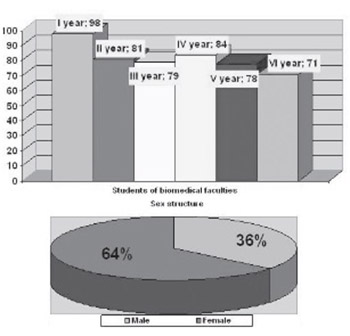How To Assess and Improve Quality of Medical Education: Lessons Learned from Faculty of Medicine in Sarajevo
DOI:
https://doi.org/10.17305/bjbms.2007.3097Keywords:
quality of medical education, assessment, survey, learningAbstract
There is no such science as medicine where half life is 7 years, what means that in 3-4 years 50% of current knowledge will be wrong. If doctors use old techniques and methods then they will cure patients wrongly. Very fast and rapid increase of biomedical sciences and medical information in certain way force medical professionals to continuity learning in order to stay update. In this project a quantitative method of examination has been used. For the purposes of the research a survey questionnaires were created consisted of 28, 35 and 18 questions for all three groups of examinees. Beside general characteristics (sex, age, faculty, and year of studies) the questionnaire included questions referring to the variables of structure, process and results in the system of education. Authors used Lickert five degree scale for the evaluation. Total of 521 students of the faculties of biomedical science in Sarajevo were surveyed; students of the Faculty of Medicine, Faculty of Dental Medicine (Stomatology), Faculty of Pharmacy, Nursing College, students of final year and postgraduate students from Faculty of Medicine, University of Sarajevo. On the basis of survey results authors concluded that the following should be done: The reform needs to be carried out in accordance with possibilities and needs, general faculty rules should include regulations that refer to insuring the quality of education, a continuous quality of studying needs to be insured - internal and external evaluation of the quality of work of respective education institution needs to be carried out, education standards need to be set, i.e. minimum knowledge and skills which a student needs to gain during studies is to be set, curriculums and programs need to be harmonized with countries in the region and Western Europe, Regular evaluation of lecturers needs to be done, Increase of size and content of the practical part of teaching needs to be encouraged as well as distance learning organized on Cathedra for Medical Informatics and Family Medicine at Faculty of Medicine in Sarajevo, increase of international and regional mobility of students needs to be encouraged, students need to be included in the faculty reform, panel discussions need to be organized where students will be informed on the reform progress, where students can talk about their problems, give suggestions and solutions to certain situations. Students are motivated to study further when their ideas are accepted, the number of books in libraries needs to increase in accordance with financial possibilities and audio/visual and electronic aids need to be purchased and in place. Concept of quality incorporates at least three dimensions and has three different meanings. Those are: - Comparative meaning in terms of the level of perfectionist, - Quantitative meaning in terms of the level accessed and - Appropriateness for certain purpose. Objective of this study is to begin process of improvement of educational process at biomedical faculties at University of Sarajevo, but ultimate goal of all involved in medical education should be large number of health professionals who will be able to work independently and cure patients in best manner in 21st century.
Citations
Downloads

Downloads
Published
How to Cite
Accepted 2018-01-28
Published 2008-02-20









